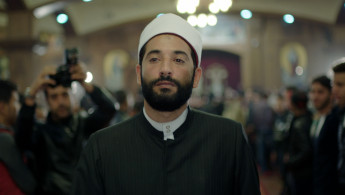Sheikh-bashing Egyptian film angers Muslim clerics
An Egyptian film that makes fun of conservative Muslim clerics and religious fanaticism has stirred controversy in the country due to its depictions of a corrupt religious establishment working with regime security agencies.
The Preacher - which hit cinemas this week - has dared to tackle sensitive religious issues, prompting an angry response from a senior Islamic cleric.
"Before this turns into a disaster we demand that this dissent is tackled and that [the film] is stopped from being shown," Mansour Mandour, chief imam at the Ministry of r
Religious Endowments said in a Facebook post addressed to the country's top Islamic figures.
"The film exposes imams to mockery, laughter and ridicule from anyone and everyone."
Mandour later said in a phone interview with a local TV station that although he hadn't watched the film he believed it "degraded the social status of preachers".
An ultra-orthodox salafi group said on Friday that it had filed a lawsuit to ban the film from movie theatres.
Twitter Post
|
"This film has no place in Egyptian cinemas," said the leader of the Daffea Movement, Mohammad Ragab, adding that it had insulted al-Azhar - Egypt's top Islamic authority.
The plot of the film revolves around a celebrity TV preacher who is entrusted with trying to dissuade a relative of the president from converting to Christianity.
It includes scenes of a bombing of a church by a militant, just weeks after a blast killed 27 people in a real-life church attack in Cairo.
The movie is based on controversial TV journalist-novelist Ibrahim Essa's bestselling book Mawlana, which appeared in English translation last year under the title The Televangelist.
The film's director, Magdy Ahmed Ali, told The New Arab that he had been scared of the reaction The Preacher might provoke but that he took a chance as he wanted to deliver a powerful message to audiences.
"The goal of the film is actually to challenge the critics of my religion and the Islamophobic rhetoric that tries to make Islam look like a religion of terrorism and violence," Ali said.
The film's leading actor, Amr Saad, who studied Quranic recital for seven months for the role, said that The Preacher's main message was that there is a serious need for an update to religious discourse.
Freedom activists have accused Egyptian President Abdel Fattah al-Sisi of running an authoritarian regime that has suppressed freedom of speech since toppling Islamist President Mohamed Morsi in 2013.
Several high profile media personalities have recently been jailed under controversial "contempt of religion" laws.
This week, the author of the book that inspired the film had his TV talk show taken off the air amid accusations that authorities pulled the programme for being excessively critical of Sisi.



